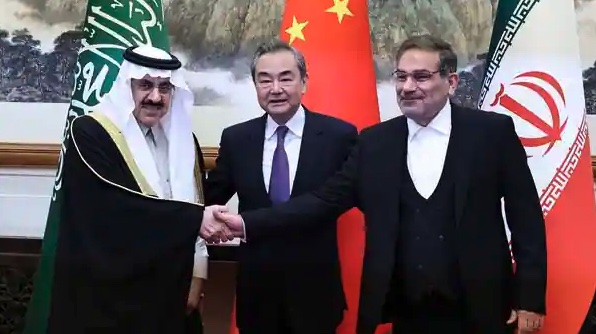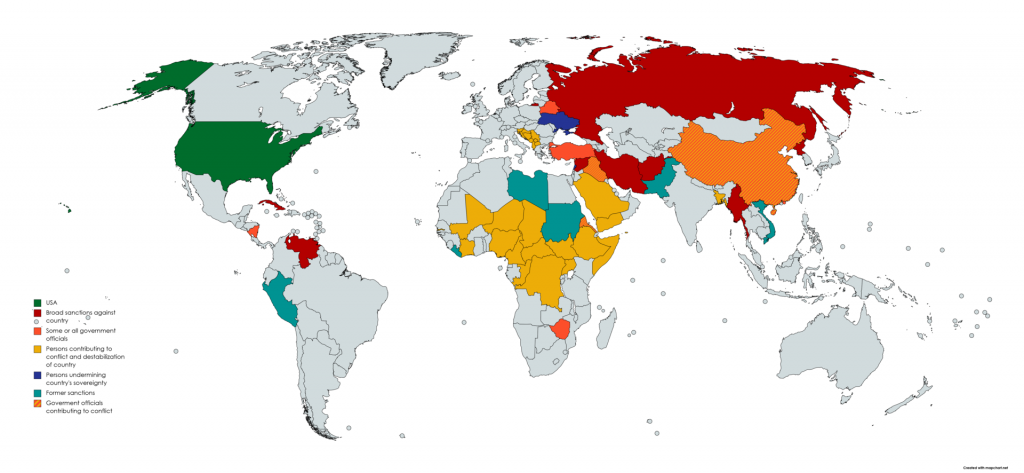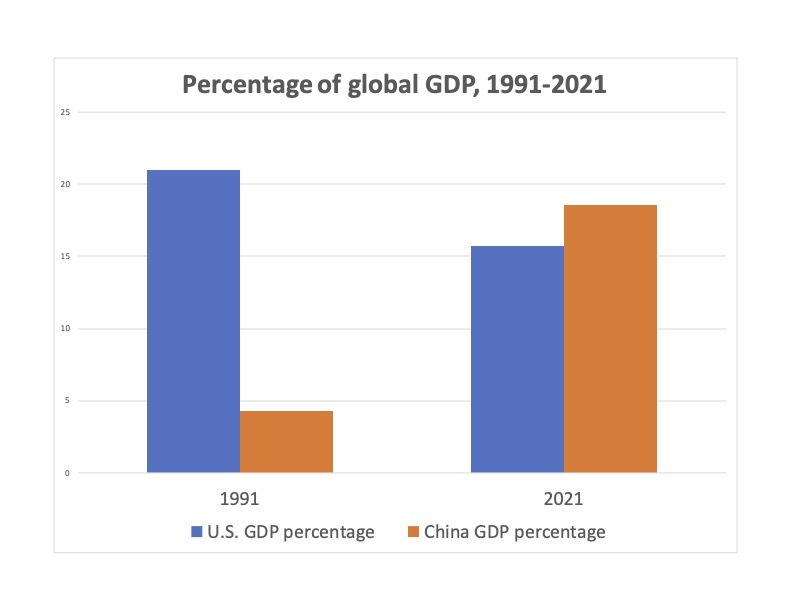This truly was “the handshake seen around the world.” Yesterday, China’s top negotiator, Wang Yi, concluded the diplomacy he and his colleagues have pursued for some months now by bringing together top negotiators from Saudi Arabia and Iran (Musaad bin Mohammed Al-Aiban and Ali Shamkhani) to conclude an agreement under which their two countries would resume their long-torn diplomatic relations within two months and start cooperation on a number of other matters.
Top officials from the United States, which has long seen itself as the overseer of all diplomatic matters in the strategically sensitive Persian Gulf and which has been maintaining tight sanctions on Iran for many years now, seemed to be taken by surprise. (One news report had a seemingly befuddled Pres. Joe Biden, on being asked about this diplomatic breakthrough, responding with boilerplate that didn’t even mention the three countries involved, but only “Israel and the Arab neighbours.”)
Here are my first quick takeaways from this news:
1. The power of the mediator
Do you remember the photos of Pres. Carter bringing together Egypt’s Pres. Anwar Sadat and Israel’s PM Menachem Begin… or Pres. Clinton slightly awkwardly trying to bring Israel’s Yitzhak Rabin and the PLO’s Yasser Arafat into a joint grip-and-grin? Those photo “opportunities” and what they represented conferred great diplomatic power on the mediator who had brought them about.
What is diplomatic power? It is credibility, constancy, and a reputation for fairness; and it’s a key element of soft power in today’s ultra-connected world.
Effective mediation also takes a lot of hard work behind the scenes, and a deep understanding of the issues and sensitivities involved. It thus requires the existence of (and continuing investment in) a deep bench of specialists in diplomacy. Wang Yi’s Gulf breakthrough demonstrated that the People’s Republic of China now has this. You could say it represents a coming-out party for the PRC’s diplomacy in the 21st century.
(Notable, too, that Wang delivered this victory to his country on the same day his boss, Xi Jinping, was confirmed in his third term as China’s president.)
2. The (still partial) eclipse of American soft power
Wang’s victory, and the diplomatic expertise on which it was built, bring attention not just to Washington’s failure to bring about any diplomatic breakthrough of comparable heft for several years now but also to the scrawny, underfed state of American diplomacy for the past few decades. In the present administration, Pres. Biden or Secretary of State Blinken may have been able to preen at carefully stage-managed events like Biden’s visit to Kyiv, or various NATO or G-7 summits. But posing for photos with a few of your like-minded friends is a very different matter than being able to help end a long-festering regional conflict that– especially in Yemen— has caused tens of thousands of deaths and widespread starvation and dislocation.
(By the way, that’s why I think Wang’s achievement has considerably more value than the various photo opps that Pres. Donald Trump was able to achieve as he touted the “Abraham Accords” between Israel and Bahrain, the UAE, and Morocco. As the horrendous recent news from the occupied West Bank underlines, those accords have done nothing at all to end Israel’s ongoing and cruel oppression of the Palestinians or its continuing aggressions against Syria.)
3. A real victory for “Team Sanctioned”
In this recent essay I wrote on the global impact of US economic sanctions I noted that over the years the United States has become so deeply reliant on using economic sanctions as its go-to tool in international relations that it had now built up quite a roster of states, of a wide variety of political orientations, whose main common factor is that they were/are members of “Team Sanctioned”. And China, as the lead member for some years now of “Team Tariffed” clearly has a lot in common with them, too.
I included there a world map I found on Wikipedia, showing how many countries in Africa and Asia have recently been the targets of US sanctions. (Click on it to enlarge.) I pointed to the fact that many of these countries have been developing payment mechanisms for transactions among them that are completely free of the control that the U.S. Treasury exerts over all global dollar transactions– and that Washington’s full-throated addition of Russia to Team Sanctioned considerably strengthened the team!
The United States, in sum, seems to have sanctioned itself into a box of its own making… and with the Handshake that Shook the World we are now starting to see some results of that.
4. The greater effectiveness of economic power over military power
In another of my recent essays, I looked at the degree to which today’s world has already, at the economic level, moved far away from the situation of U.S. hegemony that was evident in the decades after 1945. That essay contains some pretty compelling graphics (as well as some important arguments), so if you haven’t yet read it, I warmly invite you to!
Some of the key points I made there were that:
- Ever since the Cuban Missile Crisis of 1962, it has been clear that… ‘a nuclear war cannot be won and must never be fought’.
- In today’s world, military conflicts can no longer be fought ‘to the bitter end’, and therefore that…
- Today, economic strength increasingly outperforms raw military strength.
5. Impact on U.S.-China relations
Just one day before the Handshake, David Rothkopf had a tautly organized piece in The Daily Beast. It had the sub-title, “We need to get over the idea that somehow the U.S.-China relationship is a zero-sum conflict.”
I urge you all to read Rothkopf’s sensible and calmly “realist” piece. In it, he carefully deconstructs both the hawkishly anti-China testimony that Director of National Intelligence Avril Haines gave to Congress earlier in the week, and the sentiments expressed by all the serried ranks of China hawks who now seem to march in near-lockstep in both the Republican and the Democratic parties.
Rothkopf concludes with this appeal to his fellow Americans: “Managing our relations with the People’s Republic of China will be the defining foreign policy challenge of our age. Given the stakes, we owe it to ourselves to… reject the Cold War framework that is in no one’s interests, and to seek new ideas and approaches for this new era.”
Now, after the Handshake, we will need to carefully watch the continuing reactions to it from U.S. officials and congressional leaders. For those of us Americans who are civil-society activists, we should strongly urge our leaders and representatives to applaud this diplomatic breakthrough— as the United Nations leadership has already done.
Let us hope that we can also also use this clear demonstration of Beijing’s diplomatic smarts as an entryway to deeper U.S.-China diplomatic cooperation on a range of other urgent international issues. Which brings us to…
6. Implications for winning the urgently needed ceasefire in Ukraine
On February 24, China’s Foreign Ministry released a 12-point plan for the political settlement of the Ukraine crisis. The first two of these points laid out the foundational principles of “Respecting the sovereignty of all countries” and “Abandoning the Cold War mentality.” The third one called for a ceasefire, calling on all parties to, “support Russia and Ukraine in… resuming direct dialogue as quickly as possible, so as to gradually deescalate the situation and ultimately reach a comprehensive ceasefire.”
Personally, I wish the call for a ceasefire there had been stronger and more urgent. (Of interest: China itself was one of the three signatories of the ceasefire that in 1953 ended active hostilities on the Korean Peninsula– a ceasefire that is still in place today! Also to note: The government of South Korea has never signed that 1953 ceasefire, which the United States concluded with North and Korea and China “over the heads of” the Seoul government. That is definitely a precedent worth remembering regarding Ukraine today.)
Back when the Chinese released their peace plan, Secretary of State Blinken, other U.S. officials, and NATO Secretary-General Stoltenberg all pooh-poohed it. Blinken said merely that that it showed China trying to draw attention away from its support of Russia’s President Putin. There was no attempt whatsoever to engage with it.
After Beijing has demonstrated its diplomatic chops and seriousness with its achievement of the Saudi-Iranian handshake, will Washington continue to be dismissive of its diplomatic efforts on Ukraine? Let’s hope not!





2 thoughts on “The China-Iran-Saudi handshake seen around the world”
Comments are closed.